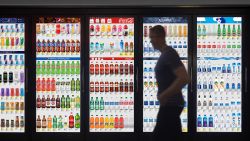Store workers at Walmart, the nation’s largest retailer, are grappling with an unnerving challenge: keeping shelves stocked and giant supercenters operating smoothly while trying to stay safe from a frightening pandemic.
“The routine is up in the air. You never know what you’re walking into and we are out of basic cleaning supplies [to sell],” said Gary, a Walmart employee in New York who spoke to CNN Business under the condition that his last name be withheld from this article out of fear of losing his job. His coworkers are “tired and frustrated” because they are working at a faster pace than normal and are struggling to meet overwhelming demand from jittery shoppers for groceries and household staples.
Although he is not “terribly worried” about getting coronavirus himself, he is concerned for older employees in his store.
“I want people to get the things they need, but I have to weigh that against keeping my people safe,” said one Walmart employee in Arizona who also spoke under the condition of anonymity out of job concerns. This employee is concerned most about riots breaking out in the store. “Customers are clearly scared, panicked, and very on edge.”
A Walmart spokesperson said that “while this is a challenging time, people have remained relatively calm,” adding, “we’re thankful for the way our associates have pulled together.”
Nearly every grocery store, retailer and major company in the service industry in America is facing similar conditions as the coronavirus outbreak spreads. But it’s a particular hurdle at Walmart supercenters, which average around 180,000 square feet, with roughly 120,000 items on the shelves and have about 300 workers. Supercenters are local hubs and 24-hour gathering areas in many American towns and cities.
“The supercenter, it’s a place that, in many communities, it’s central to the community -— like the heartbeat,” Walmart (WMT) US CEO John Furner said at an investor conference last month. “It’s often one of the largest employers in town. It’s one of the largest grocers in town.”
Employees are scrambling to adjust to rapidly changing conditions on the ground and contain the spread of the virus. Workers say it’s been busier in the past week than during the holiday season.
Walmart is giving store managers discretion to limit purchase quantities of items that are in unusually high demand, such as hand sanitizer and cleaning wipes.
Employees are prioritizing stocking shelves as soon as delivery trucks drop off boxes of supplies, instead of filling up throughout the day.
On Sunday, Walmart began closing its stores overnight to give employees time to stock shelves and scrub down aisles. Walmart is cleaning cash registers, checkout stations, shopping carts and employee breakrooms more frequently than usual and giving employees step-by-step processes with videos and photos on how to clean. Employees have a voice-activated app called Ask Sam that they can use to ask for cleaning guides for any area of the store, the company said.
For customers, Walmart has also put out cleaning wipes and hand sanitizer pumps at the entrance of stores, according to the company.
Last year, Walmart, the largest private employer in America implemented a policy that tied workers’ quarterly bonuses in part to their attendance records to limit absences. But Walmart has waived that policy through the end of April.
The company is telling employees who are not feeling well to stay home, but they have to take their regular paid sick leave to do so. Walmart has also created an emergency paid leave policy for employees who get coronavirus or who live in areas under quarantine.
Some workers say they are relieved they have access to paid leave if they become infected with coronavirus and won’t lose their jobs.
Other employees hope Walmart will take greater precautions in stores to limit the risk of an infection or consider closing stores altogether and switching to only in-store pickup or home delivery.
Customers and employees are not practicing social distancing, said Gary, the worker in New York. “Management continues to have regular staff meetings where we are corralled into a giant group shoulder to shoulder.”


























